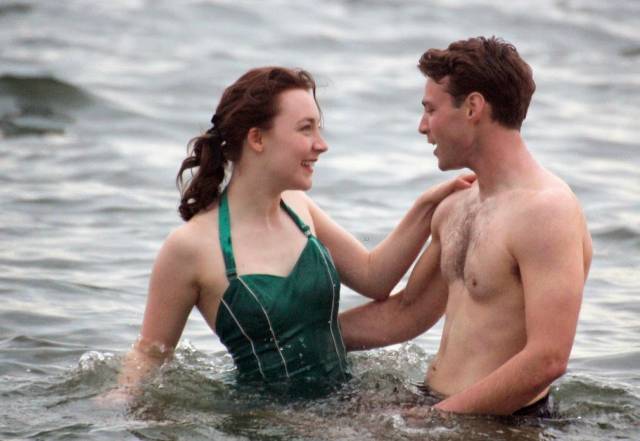
 It’s no secret that the middle has fallen out of cinematic landscape, and while this is usually discussed from a financial perspective, it’s also reflected in the tone of films. Audiences are trapped between self-proclaimed epics that trumpet their size and splendor in every frame while shunning authentic human feeling and, on the other hand, micro-budgeted indies whose plots too often feel paper-thin and too absurdly localized to engage a larger audience. John Crowley’s Brooklyn, based on the novel by Colm Tóibín, proudly reclaims that middle ground, presenting an ordinary life and investing it with an epic sweep, relating both the personal story of Eilis Lacey (Saoirse Ronan) and the historical tides that carried her and so many others to a new life in America.
It’s no secret that the middle has fallen out of cinematic landscape, and while this is usually discussed from a financial perspective, it’s also reflected in the tone of films. Audiences are trapped between self-proclaimed epics that trumpet their size and splendor in every frame while shunning authentic human feeling and, on the other hand, micro-budgeted indies whose plots too often feel paper-thin and too absurdly localized to engage a larger audience. John Crowley’s Brooklyn, based on the novel by Colm Tóibín, proudly reclaims that middle ground, presenting an ordinary life and investing it with an epic sweep, relating both the personal story of Eilis Lacey (Saoirse Ronan) and the historical tides that carried her and so many others to a new life in America.
At the film’s onset, Eilis has come of age in an economically depressed post-war Ireland that seems to have no place for her. Her older sister and two priests on either side of the Atlantic arrange for her to immigrate to booming New York City, or more specifically, to the established Irish community in Brooklyn. At first she’s adrift without her traditional support structure, but she soon learns to cherish the freedom of talking with people “who don’t know your auntie.” Overcoming her homesickness, working one job and taking classes in bookkeeping, she matures into a capable young woman and finds love in the form of the kind and modestly ambitious Italian plumber Tony (Emory Cohen). However, Eilis must return to Ireland after a tragedy, where she finds the doors that were closed to her before are suddenly open, as she’s immediately offered her desired job and pursued by a charming and stable beau (Domhnall Gleeson). Eilis must choose between the life she was brought up to desire and the life she’s created for herself in America.
Brooklyn pulls off the feat of adapting a novel that uses first person narration without using narration in the film. The film accomplishes this through the judicious use of close-ups and the terrifically expressive performance by Saoirse Ronan. There’s a classicism to Brooklyn, both in the direction and in the straightforward narrative that lacks even a shred of irony, that recall films from the 20s or 30s before the popular was cleaved from the prestigious. The film is sentimental in an earned, sincere way, without crossing the line to maudlin, balancing its tender love story with humor and sadness. Brooklyn is a rejoinder to the idea that sophistication must equal a more complicated narrative with dark, tortured characters, instead offering a simple story well told of good people trying their best. That being said, some will chafe at the lack of surprises Eilis faces, the relative placidity of drama between characters, and the bluntness with which the film presents its vision of “what could have been.”
Overall, Brooklyn succeeds because in every scene, Crowley and Ronan are able to impart Eilis’s feelings with stunning precision, in both big moments and small, which is all the more powerful because the character is quiet and reserved. With its unadorned sincerity, Brooklyn is both wonderfully evocative of its specific setting and a universal story of immigration and coming of age.